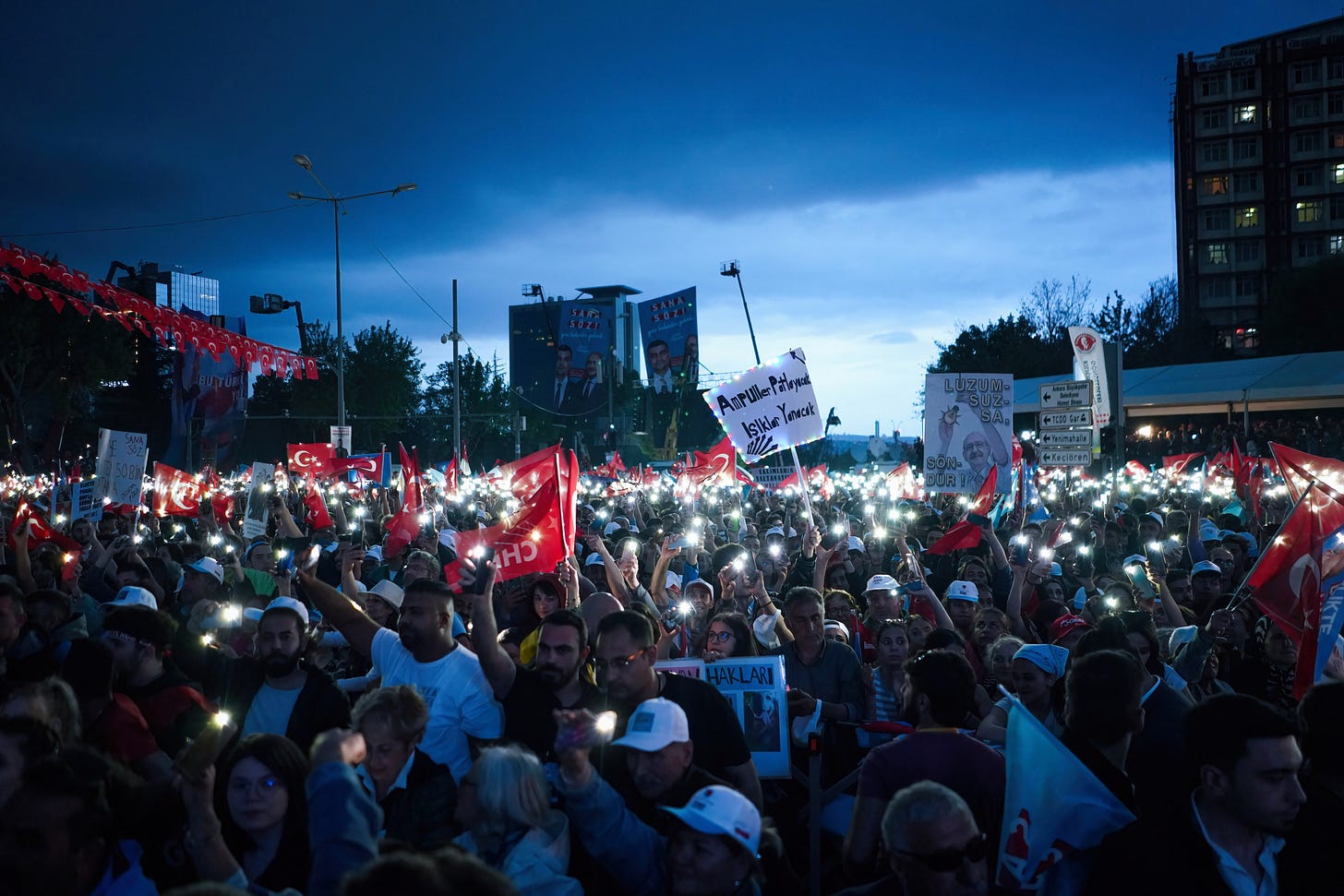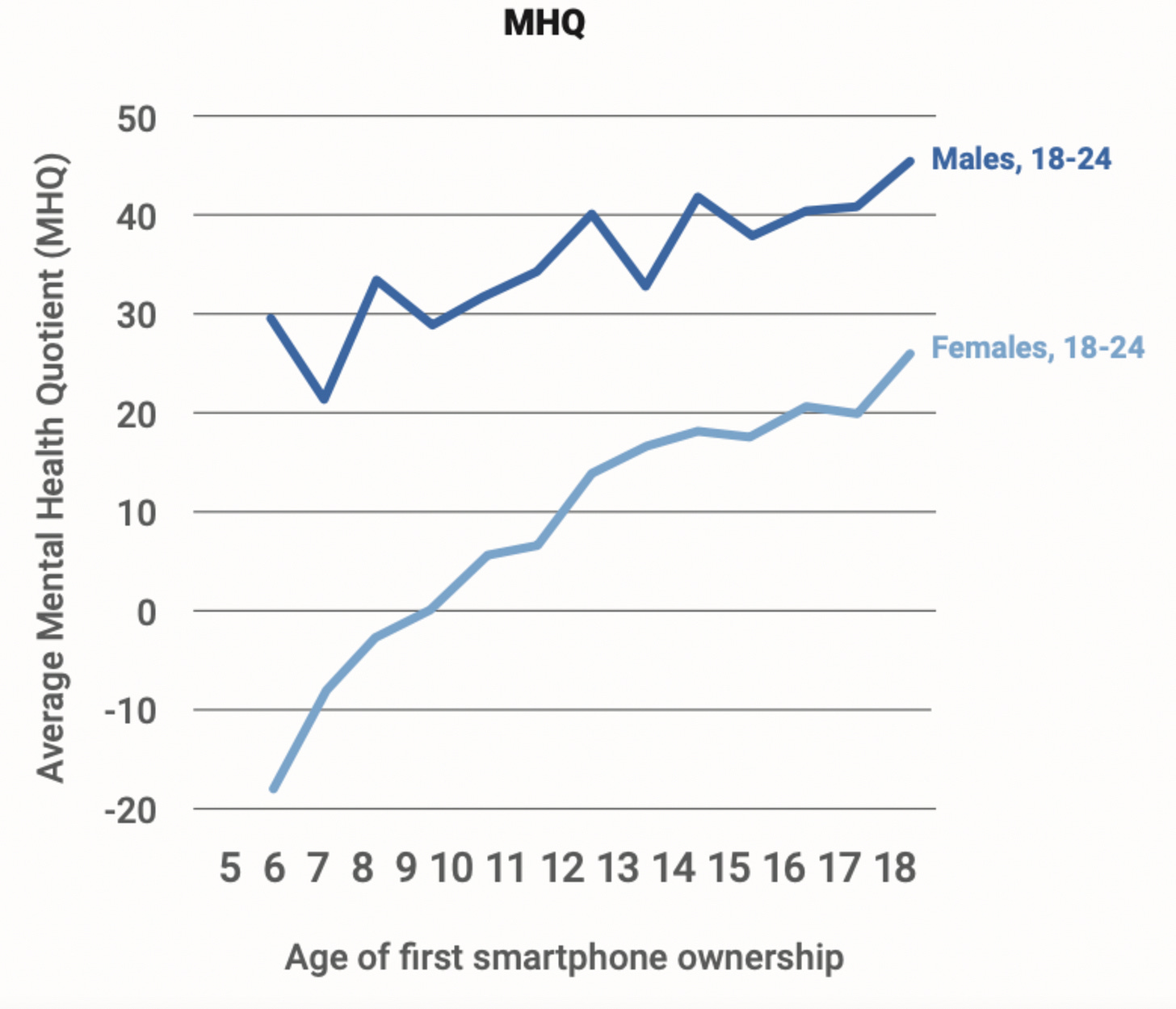TL(PM) DIGEST: A wild election weekend in Turkey
Plus more European arms to Ukraine, how smartphone use damages youth mental health, and the supply-side dimensions of the fentanyl crisis

1. Turkey headed to presidential run-off after chaotic weekend of voting
What happened? Turkish President Recep Tayyip Erdogan and opposition challenger Kemal Kilicdaroglu will likely head to a run-off election on May 28 after neither candidate won a majority in official tallies—though, as Council on Foreign Relations senior fellow Steven A. Cook tells TLP, “I don't think we will ever know the actual results from Sunday's voting. The AKP [President Erdogan’s ruling party] challenged millions of ballots. It is unclear whether those votes were ever counted.”
Why does it matter? “The next two weeks in Turkey are going to be intense and potentially dangerous,” Cook says—and Erdogan has the advantage. Political deadlock and possible instability in Turkey will have ripple effects overseas, not least potentially sinking the Black Sea Grain Initiative that allows Ukrainian grain to reach global markets and further delaying Sweden’s NATO membership.
TLP’s take: Over the course of two decades in power, Erdogan has grown increasingly authoritarian and taken a number of actions contrary to U.S. interests, like buying Russian surface-to-air missile systems and holding up Sweden’s NATO membership on trivial pretexts. It wouldn’t solve all outstanding problems between the United States and Turkey if Erdogan lost this election, but it would be good for democracy and liberalism in Turkey and around the world if he did—though that seems unlikely now, and Erdogan himself seems to have no intention of allowing Turkish voters to remove him from office.
2. More European military aid for Ukraine
What happened? Key European nations made substantial pledges of additional military assistance to Ukraine during President Zelenskyy’s recent tour of the continent, with Germany announcing a $3 billion arms package, France promising more light tanks and armored vehicles, and the UK detailing a new training program for Ukrainian pilots intended to prepare them to fly F-16 fighters. Though Ukraine has yet to launch its counteroffensive, its military has taken back chunks of territory in and around the heavily contested city of Bakhmut—where Russian forces have attempted at great cost and without success to batter their way into the city.
Why does it matter? More equipment and ammunition to Ukraine from any and all sources will be critical once the country embarks on its much-anticipated counteroffensive in the months ahead. It’s also an important diplomatic signal, one that tells Moscow and Kyiv that America’s European allies remain committed to Ukraine’s fight against Russian aggression.
TLP’s take: It’s great that America’s European allies are stepping up their military aid to Ukraine on their own initiative, without all the diplomatic bickering and sniping that accompanied previous moves to supply Kyiv with modern tanks and other equipment. Still, more can and should be done—like providing Ukraine modern fighters and longer-range missiles to strike Russian military targets.
3. Parents, don’t give your kids a smartphone too early—it’s science
What happened? Jonathan Haidt and Zac Rausch report on the million-plus interviews conducted by Sapien Labs on issues related to youth mental health across the globe. Adding a question about smartphone use to the current wave, researchers found: “the younger the age of getting the first smartphone, the worse the mental health that the young adult reports today.”
Why does it matter? Sapien Labs created a Mental Health Quotient (MHQ) index combining 47 different indicators of “mental, social, and emotional functioning” in life, with higher numbers indicating better self-reported mental health outcomes. As their chart below shows, the age that a person reports first owning a smartphone severely impacts their mental health outcomes—the longer one waits for a phone, the better their mental health later in life.
TLP’s take: Based on the preponderance of evidence, Haidt and Rausch recommend that parents (if not policymakers) should seriously consider limiting their children’s access to social media and other attention-disrupting applications that tech companies force on people through their phones and apps—at least until high school. Schools themselves are already having a serious issue with phone use in classrooms and should consider “no-phone” policies during school hours, while Congress and state legislatures need to get serious and enact minimum age and consent laws for social media and device use.
4. The supply-side fentanyl crisis and border policy
What happened? The Economist offers a deep dive on the huge amounts of fentanyl coming into the United States from just one border crossing:
Nearly half of the fentanyl, a potent synthetic opioid, seized by Customs and Border Patrol agents since 2020 has been captured near San Diego. “I’m ground zero,” says Todd Gloria, the mayor of the city.
Why does it matter? As policymakers grapple with the surge of undocumented migrants at the border, a far more deadly challenge remains unaddressed. What began as an opioid epidemic started by the pharmaceutical companies has morphed into a massive international fentanyl production and supply-chain network that left more than a 100,000 Americans dead in 2022. Despite good work by American officials last month that led to the indictment of “28 people involved in the fentanyl trade, including the ‘Chapitos’, the sons of Joaquín ‘El Chapo’ Guzmán, the former leader of Mexico’s Sinaloa cartel,” the scale of the problem remains enormous—and dire.
TLP’s take: Drugs like fentanyl produced in Mexico, with component chemicals coming from China and other nations, killed more young Americans than did COVID-19 in recent years. At some point, the president and Congress need to overcome their differences to develop and fund a full-scale disruption of the supply-side of the fentanyl trade and close the borders to this poison. Trepidation about missteps in the last war on drugs shouldn’t make us complacent about the direct and immediate fentanyl threat to our communities.
Just one more thing…
Saturn has dethroned Jupiter as king of the satellites after the International Astronomical Union recognized 62 more moons orbiting the ringed planet, brining its total to 145 to Jupiter’s 95.






